Top 10 Foods That Actually Help With Opiate Withdrawal
Table of Contents
- Top 10 Foods That Actually Help With Opiate Withdrawal
- Reasons Why Nutrition Plays an Important Role in Addiction Recovery
- Our Top 10 Foods That Help with Opiate Withdrawal
- 1. Water
- 2. Vibrant Vegetables
- 3. Herbal Teas
- 4. Raspberries
- 5. Foods with Healthy Fats
- 6. Organic Foods
- 7. Whole Grains
- 8. Eggs
- 9. Natural Proteins
- 10. Beans
- Foods to Avoid During Opiate Withdrawal
- Help Your Body Through Opiate Withdrawals the Right Way
- FAQ on the Top 10 Foods That Help With Opiate Withdrawal
Detoxing from opiates is an arduous journey that is immensely uncomfortable and, in some cases, can even be life-threatening — especially if it’s not overseen by medical professionals. For those who are heavily addicted to these deadly drugs and have abused them for years may need to have their detoxification and withdrawal medically managed in order to work through it safely and comfortably. With this in mind, our writers have come up with a reference guide to the ‘Top 10 Foods that Help with Opiate Withdrawal’ for you to get past the discomfort of detoxing.
However, many experts believe that in addition to medical management, the food we consume actually plays a significant role as well. There are specific foods that assist in opiate detoxing by providing the body with the vitamins and nutrients it desperately needs to work through withdrawal.
Opiate detoxing is a lengthy process that requires a regulated and integrative approach. In this approach, one’s diet can be critical and can even make this difficult procedure a little more tolerable.
Reasons Why Nutrition Plays an Important Role in Addiction Recovery

Whether you’re just starting out on your journey to recovery or you have been drug/alcohol-free for a few months, nutrition plays an important role in recovery. Here are a few reasons why:
- Addiction often leads to malnourishment. For those with alcohol addiction, drinking the empty calories that are found in wine, beer, and liquor, creates the false illusion of feeling full. Unfortunately, as a result, many alcoholics fail to eat a healthy diet while they are in active addiction, because the alcohol tricks their bodies, and also because they usually can’t eat until they have begun drinking.
- As with alcoholics, opiate users usually feel nauseous or unable to eat until they ingest their drug of choice first. The primary concern on their mind is usually the next fix, rather than the next meal.
- With an internal system that is already plagued by diarrhea, indigestion, constipation, and nausea, adding in the non-healthy food items that are usually the most affordable options for those with opiate dependence, throws an entirely new obstacle in the body’s fight for regularity.
- Although many of us who are now sober can joke about how we never got sick when we were using, the reality is that addiction can actually severely damage one’s immune system. Substance abuse and the malnutrition that follows completely disrupt the body’s natural defenses against viruses, bacteria, etc.
- Addiction can severely damage your liver. Heavy use of drugs or alcohol combined with a decrease in nutrients lowers your liver’s ability to filter toxins. The process triggers a dangerous one-two punch to your body by causing the liver to swell. When this occurs, it increases the likelihood of developing liver cancer and also reduces an already lackluster appetite.
Our Top 10 Foods That Help with Opiate Withdrawal
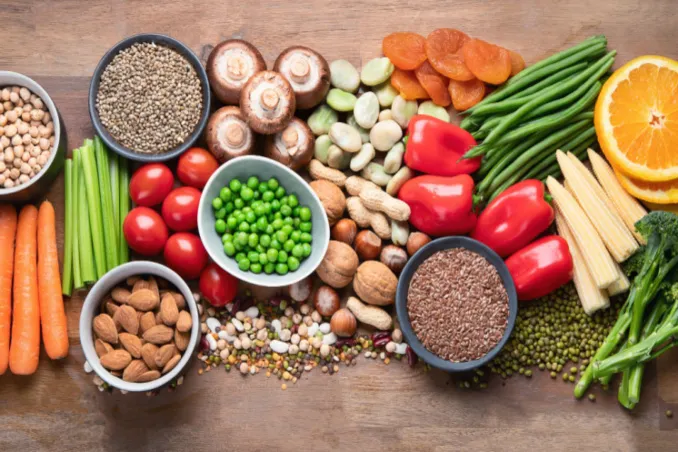
Did you know your liver is the central component of the entire withdrawal and detox process? Your liver is in charge of processing the toxins from the opioids and expelling them from the body — completely ridding the system of the deadly drug.
The withdrawal and detoxification of opioids is a very taxing process that requires the strength, support, and assistance of licensed medical professionals. Some forms of opioids tend to cause withdrawal sooner than others and can even last longer. However, the longevity of withdrawal also depends on the severity of symptoms as well as the duration of use.
To help alleviate the symptoms and assist with the detoxification process, there are, surprisingly, many different types of food that prove beneficial. If you or someone you love is taking the first step towards sobriety and commencing the detoxification phase, here are 10 foods that will help make the process a little easier:
1. Water
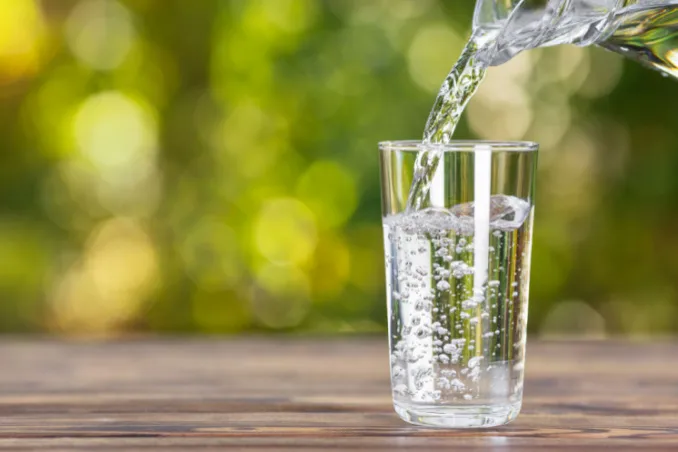
Since the liver plays a critical role in the detoxification process, proper hydration is essential. As you detox, your liver metabolizes and rids the body of any remnants of opiates. In order to flush these toxins out of your system, your body needs a steady flow of water and fluids to stay hydrated, a prime reason good old water makes the top of our list of ten ‘foods’ to help you with opiate withdrawal.
A small number of opiate toxins can be expelled from the body through perspiration (which occurs frequently during detox), but the bulk of the toxins are primarily metabolized in the liver. Water and hydrating fluids allow the liver to run the normal course of detoxification, enabling the body to efficiently rid itself of toxins and start recovering.
During the withdrawal and detoxification process, the body experiences many extremes before it finally resets itself and resumes its normal function. Symptoms like sweating, vomiting, and diarrhea are highly common during detoxification and the main culprits of dehydration. To balance out the water loss from withdrawal, medical professionals advise consuming 0.05 to 1 ounce of water per pound of an individual’s body weight — 1.5 to 2 ounces if symptoms are more aggressive.
2. Vibrant Vegetables
Vibrant and delicious vegetables are an excellent source of nutrients that do more than add a little variety to your dinner plate. In fact, they play an important role in the detoxification of opiates. The vitamins and minerals in vegetables help supply and regulate the body while it works through the withdrawal phase.
Fun fact: the color of vegetables can determine the types of vitamins and minerals it’s rich in. usually, the darker the veggie, the more nutrients it has. For example, red and orange veggies like peppers and tomatoes are higher in Vitamin C, while leafy green veggies like kale and spinach are rich in iron and protein. Together, these vitamins and minerals provide the body with the nourishment it needs to replenish itself.
Additionally, vegetables like carrots, beets, and broccoli are also beneficial to consume during detox because of their excellent levels of fiber. Often, those recovering from opiate addiction have many digestive problems, and veggies that are filled with fiber are a prime solution for that.
3. Herbal Teas

In addition to water and hydrating fluids, herbal teas are also known to offer natural remedies to withdrawal symptoms — easing the body to recovery. Not only will tea provide well-needed hydration, but its numerous health-promoting properties and variety are a tasty and healthy alternative to sugary beverages.
Here are a few teas that offer a helping hand to those in opiate withdrawal:
- Chamomile Tea: This popular tea is well known for its sleeping-aid properties, which is very helpful for those who suffer from insomnia during detox. Chamomile tea also has antibacterial and anti-inflammatory properties that protect the liver — the lead organ in detoxification.
- Peppermint Tea: A favorite to many, peppermint tea has a variety of health properties that prove to be beneficial to those recovering from opioid addiction. Specifically, peppermint tea is known to support the digestive tract, which, as we stated earlier, is a common problem in withdrawal. Peppermint soothes stomach pain, relieves ingestion, and reduces nausea
- Ginger Tea: Ginger tea is an excellent supplement for withdrawal patients, as it’s known to stimulate sweating — allowing the toxins to rid the body faster. Ginger tea also has disease-fighting antioxidants, indigestion and constipation-relieving properties, and is an effective remedy for intense nausea.
- Green and White Tea: White and green tea have an impressive amount of health properties that alleviate and eases the pain of withdrawal. Both of these teas improve liver function so that it can metabolize and expel toxins better.
Plenty of evidence shows that regularly drinking tea can have lasting benefits on one’s health and wellness. For those experiencing opiate withdrawal, it would be greatly beneficial to supplement their hydrating fluids with tea.
4. Raspberries
This sweet, tart, and delicious fruit is packed with vitamins, minerals, antioxidants, and fiber. Importantly, raspberries have a healthy dose of manganese, which is known to regulate blood sugar — similar to fiber which helps lower blood sugar and helps regulate proper digestion.
In addition to the blood sugar properties of fiber and manganese, raspberries are also notorious for their sweet and sour taste. Their delicious flavor makes them the perfect snack and pick-me-up when the cravings kick in.
5. Foods with Healthy Fats
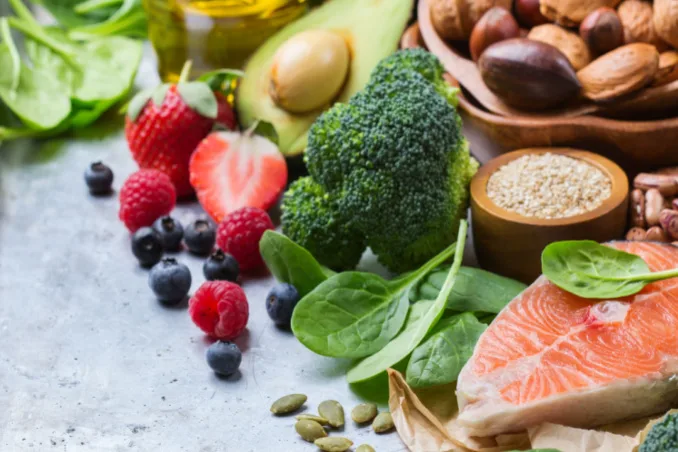
Healthy fats are vital to our brains. Healthy fats like unsaturated fats and omega-3 fatty acids are needed by our bodies to produce energy, absorb vitamins, and increase our heart and brain health. Importantly, these fats are essential to the liver, as they help decrease the buildup of excess fats and maintain optimal enzyme levels. The liver needs all the help it can get during an opiate detox cleanse.
It’s understandably difficult to maintain an appetite during opiate withdrawal, but the following foods are filled with healthy fats and provide beneficial nutrients to individuals in detox. Some of the best options include avocado, fish (primarily salmon), nuts, peanut butter, tofu, and more.
6. Organic Foods
The debate of whether organic foods make a difference for your health has gone on for years. However, many studies show that organic foods provide significant health benefits — not to mention, they ease opiate withdrawal.
Organic foods are grown without synthetic herbicides, pesticides, and fertilizers, while organic livestock is raised in natural conditions and are not given antibiotics, growth hormones, and animal by-products. These practices enable farmers to produce meat and produce that 100% pure and natural. In turn, this allows our bodies to break down and process this food better without the risk of consuming dangerous chemicals and hormones. This is especially true for our livers.
Since the liver already plays a vital role in the detoxification process, it’s important to supply it with foods that are not filled with unnatural chemicals and by-products. The liver already has the tough job of expelling the opiate toxins from the body; why add unhealthy foods to the mix? Richer in nutrients and GMO-free (Genetically Modified Organisms), organic foods are highly beneficial to the body, especially when it’s experiencing something as serious as opiate withdrawal.
7. Whole Grains
Whole grains are essential components of any diet, as they are abundant in nutrients like protein, fiber, vitamins, antioxidants, and minerals (iron, zinc, copper, and magnesium). With a delicious variety and optimal nutritional value, whole grains offer a plethora of health benefits like reducing the risk of high blood pressure, heart disease, and diabetes. Additionally, whole also supports healthy digestion and the reduction of inflammation.
Maintaining a balanced diet with whole grains is highly important during the stages of opiate detox. While the fiber helps with digestion and constipation, the “good” carbohydrates in whole grains also help with hydration — allowing your body to properly retain water. Additionally, the vitamins and minerals packed in whole grain foods help your body feel full, satisfied, and less likely to snack on unhealthy foods.
8. Eggs
Since withdrawal and detoxing from opiates is an extreme process for the body, many individuals experience deficiencies in essential vitamins and minerals as a result. In particular, B vitamins are greatly lacking in withdrawal patients. B vitamins directly impact one’s energy levels, brain function, and protects the body against infections.
Eggs are an excellent source of B vitamins and a healthy food option to replenish this necessary vitamin. Eggs are filled with vitamin A, calcium, zinc, and vitamins B5, B12, B2, and vitamin B6. Eggs are also a great source of protein and another food that fills and sustains the body.
9. Natural Proteins
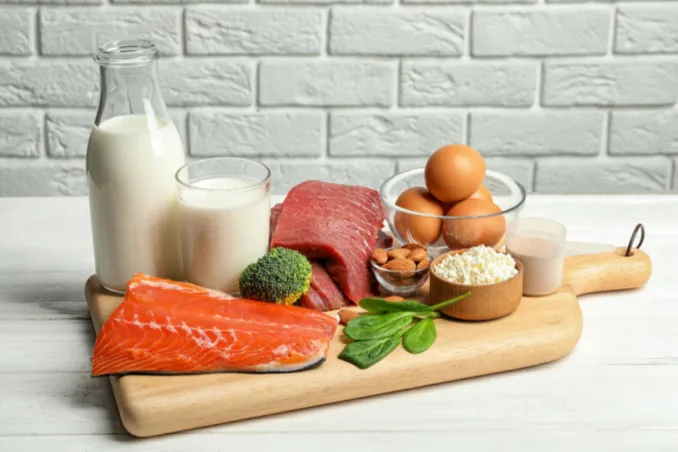
Protein is an all-encompassing nutrient that promotes strength, energy, a healthy metabolism, and heart health. Natural proteins also contain amino acids that help repair cells. Together, these components of protein also aid in the withdrawal process.
In the appropriate portions, proteins can actually help the body repair itself after sustaining injuries — especially in the case of organs like the heart and liver. Protein helps speed up recovery when the body is hurt, and the same can be said about the detox and withdrawal process. Some examples of healthy foods filled with fiber include seafood, white meat poultry, milk, cheese, yogurt, eggs, soy, and lean beef. Beans are another excellent source of protein, which we dive into next.
10. Beans
Beans are a great source of protein, fiber, iron, and vitamins. Importantly, beans contain amino acids that are the building blocks of protein that enable the healing of bone, muscle, hair follicles, skin, tissue, and blood. Beans are also known to help prevent fatty liver, which occurs when unhealthy fats accumulate in the liver — presiding alongside obesity, high cholesterol, and high blood pressure. For these general health reasons, along with their power as a filling aid to digestion, beans bring us the final of our ’10 Foods That Help with Opiate Withdrawal.’ Also packed with fiber, beans support excellent digestive health, which proves to be helpful during opiate detox.
Foods to Avoid During Opiate Withdrawal
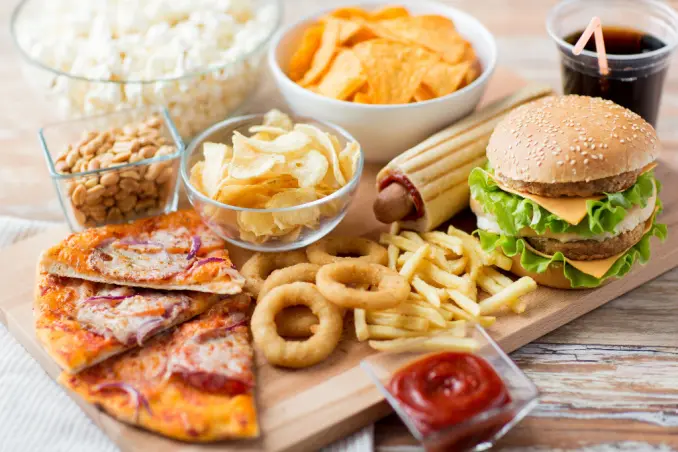
The healthy foods you put into your body are just as important as the unhealthy foods you try to avoid. During opiate withdrawal, it’s imperative to maintain a healthy diet and keep hydrated in order to withstand the most difficult points of this important process. There will be moments where it might be difficult to keep a steady diet, but when one’s appetite returns, it’s ideal to stay away from the following:
- Foods High in Saturated Fats: Foods that are high in saturated fats need to be avoided during the detoxification process due to their unhealthy nature. Saturated fats are known to raise cholesterol and negatively impact the liver. As mentioned before, the liver has one of the most important parts in the detoxification process, and it can’t be bogged down by unhealthy fats. Examples of food that contain unsaturated fat include butter, pastries, fatty meat, processed meat, and full-fat dairy products.
- Processed Foods: This group of food, while convenient, is filled with excess salt, sugar, and fat. These additives are very unhealthy for the body and contribute to a number of health problems. Common processed foods include chips, cookies, sugary cereal, certain types of cheese, bacon, popcorn, and more. If you or someone you know is detoxing from opiates, be sure to avoid these foods entirely.
Help Your Body Through Opiate Withdrawals the Right Way
Proper nutrition is the key to living a healthy life. Unfortunately, eating healthy foods isn’t always as easy as it seems when we are surrounded by processed and fatty foods that are cheap and easy to access. Regardless, an effort must be made to maintain a balanced diet, especially in the case of detoxifying. The right foods can provide your body with the tools it needs to work through the withdrawal process and recover at a better pace.
If you or someone you love is struggling with opiate addiction, our team of professionals is here for you. At Find Addiction Rehabs, we can help pair you with the right rehab and detox center that will support you during this difficult time. Recovery is within reach — call our addiction specialists today to start your journey to sobriety.
FAQ on the Top 10 Foods That Help With Opiate Withdrawal
Why are opiates so addictive?
Opiates alter brain chemistry by binding to opioid receptors involved with feelings of pleasure and reward. Over time, these drugs can cause changes in the brain’s structure and function. These changes may lead to tolerance and dependence on opiates as well as withdrawal symptoms if use is stopped abruptly.
How can your diet actually impact the severity of opiate withdrawal?
It’s important to understand that your diet can impact the severity of opiate withdrawal. Protein is an essential building block of muscle tissue. It also helps regulate blood sugar levels and prevents muscle breakdown. Eating protein-rich foods will help prevent muscle wasting during opiate withdrawal. Examples include eggs, chicken breast, tuna, and salmon.
How long can the withdrawal period for opiate addiction last?
This is a complicated question. The withdrawal period for opiate addiction lasts as long as it takes to overcome the physical dependence on the drug. It can take anywhere from 10 days to several months, depending on the type of drug being abused and the length of time you have been abusing it.
Should you seek professional treatment for opiate addiction?
If you, or a loved one, are addicted to opiates, it is crucial to seek professional treatment as soon as possible. Opiate addiction is a severe problem that can cause serious harm to both the individual and those around them.
If you do not treat this problem immediately, it will only worsen. Find Addiction Rehabs can and will help. Make the confidential call today to find out more information and get the helping hand you need to get (and stay) clean for good!
Anna M. joined Find Addiction Rehabs with extensive experience in the field of addiction treatment. As a former Nurse Practitioner in Miami, she found her passion for addiction treatment when a family member was lost to his disease. With each article and resource, she hopes to save other families from experiencing the anguish of a loved one’s passing due to drinking or drugs.


